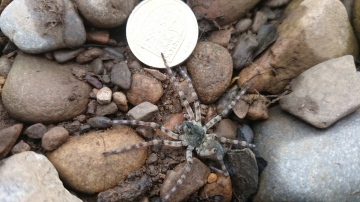Notes on Arctosa cinerea

Arctosa cinerea in Mid-Wales by Evan Jones
From The Newsletter No. 103 July 2005
I have just returned from Wales where I looked for
Arctosa cinerea, locating it at a known site on the
River Rheidol near Aberystwyth. Whilst there, I took
photos of the spiders at their burrow entrances,
which were over a centimetre in diameter. Initially I
searched under stones, as suggested in the literature.
After a long search I found a single specimen. I
began to realise that the spider does not actually live
under stones as such, but instead acts like an
enormous Arctosa perita, constructing a burrow and
sitting in the sunshine at the entrance to hunt. I began
to look for burrows in dry shingly sand and found
over 20 in a small area in quick succession. The
spiders appear at the burrow entrance after a short
while, disappearing at the slightest movement.
Added by John Partridge at 15:27 on Fri 17th Feb 2012.
ARCTOSA CINEREA IN SOUTH WALES by Cynthia Merrett
From The Newsletter No. 23 December 1978
As fellow colleagues in other Museums will know only too well, for every ninety-nine identifications one makes for members of the public, only one will turn out to be of special interest, and it is therefore all too easy to discourage visitors from bringing in further 'finds' if one is careless enough to show any lack of enthusiasm while dealing with their queries. Diplomacy when identifying something comnon can encourage people to return again and again and suddenly -the 'one-in-a-hundred' identification turns up and one's enthusiasm is spontaneous and genuine. Such was the case recently when I returned to the Museum after some leave, to find a live specimen of Lycosid awaiting my attention. It had been found on the stoney river bank of the River Sirhowy in Gwent during August. Thinking it to be one of the commoner species I tried to identify it with a hand lens without killing it. However, when I realised it was Arctosa, a genus that I lacked in my collection, I killed it and examined it under the microscope. With honesty I must admit that I still wasn't sure of the evidence before my eyes, so packed it off to Dr. Peter Merrett for comment. He was pleased to advise me that it was an adult male Arctosa cinerea and the furthest southern record in Britain to date.
I cannot help comparing the ease with which this specimen came to hand,
with a. certain day's searching for it on a shingle bank of the River Tay in
1974, while staying at Kindrogan Field Centre, Perthshire. We seemed to have
turned over nearly every rock and boulder in the area, and one of the party
(who will, no doubt, remember the incident well) even waded up to his
armpits across the river to try the far shore, but all to no avail. Even
the sun went in, and the rain came down on us to add insult to injury, before
we retired empty-handed from the area. However, although it is very pleasant
to receive that which you need with so little effort, Arctosa cinerea will
always be connected in my mind with the River Tay and my good companions of
that day.
Added by John Partridge at 16:10 on Wed 28th Dec 2011.
Return to Summary for Arctosa cinerea